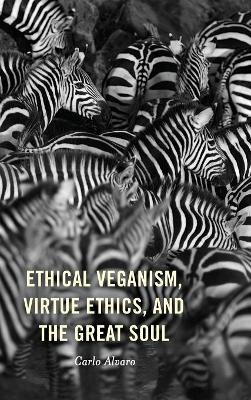
Ethical Veganism, Virtue Ethics, and the Great Soul
Lexington Books (Verlag)
978-1-4985-9001-3 (ISBN)
Millions of animals are brought into existence and raised for food every year. This has generated three serious problems: first, intensive animal farming is one of the leading causes of environmental degradation. Farming livestock contributes to a large amount of greenhouse gases to the atmosphere each year; it contributes to land and water degradation, biodiversity loss, coral reef degeneration, and deforestation. Second, raising animals for food causes millions of animals to suffer and be killed. And third, consumption of meat and animal products is linked with heart disease, diabetes, and various cancers. Consequently, a global change in the way that animals are treated is imperative. Many moral philosophers have suggested a move toward vegetarianism. But vegetarianism, unfortunately, still relies on raising animals for food, and does not avoid the deleterious effects of animal products on human health. The right solution is ethical veganism, which is the avoidance of all animal products and by-products. Some moral philosophers have framed ethical veganism in terms of animals having the same fundamental rights as humans, a notion that is highly controversial. In any case, the view that animals have rights is not capable of generating the moral duty to embrace ethical veganism. The answer is to adopt a virtue-oriented approach to the treatment of animals because the acquisition of virtues, such as compassion, magnanimity, temperance, and fairness enable people to see that raising and using animals for food is unfair, callous, and self-indulgent.
Carlo Alvaro teaches philosophy at New York City College of Technology of the City University of New York and at St. Francis College.
Preface
Acknowledgments
Introduction
Chapter 1: Kant, Animals, and Indirect Moral Duty
Kant, Marginal Cases, and Animals
What’s Wrong with the Indirect Duty View?
Two Neo-Kantian Views
Chapter 2: Utilitarianism: All that is Gold does not Glitter
Some basic Tenets of Utilitarianism
Utilitarianism = Vegetarianism?
Conclusion
Chapter 3: Eating People and Eating Animals
Utilitarians and Animals
Eating Animals and People
Marginal Cases
Conclusion
Chapter 4: A New Horizon: Virtue Ethics
On Morality and the Discipline of Non-Aretaic Authorities
What is Virtue Ethics?
The Virtue Approach
The Components of VE
More Objections
Chapter 5: What about Our Treatment of Animals?
The Scope of Virtue
Animal Ethics Needs Virtue
Chapter 6: Veganism as a Virtue
Embracing Virtue
Some Tenets of Virtue Ethics
Four Important Virtues: temperance, compassion, fairness, and greatness of the soul
Eating Meat and the Destruction of the Environment
Conclusion
Chapter 7: Some Objections
Being Vegans is not for everyone
Where Do We Draw the Line?
Plants Suffer Too
Eating Meat is an Enjoyable Experience
Eating animals is natural
Animals Eat Other Animals
What about Tradition?
Religion Allows Meat
Eating Meat is Healthful
Chapter 8: Awareness: What we do to Animals
Awareness
Should We Become All Vegans?
The Link between Virtue and Veganism
Reaching People in Non-Manipulative Ways
Chapter 9: Ethical Veganism’s Beef with Cultured Meat
Virtue and Objections
Ethical Veganism and Lab-Grown Meat
Abortion and Meat
Conclusion
Bibliography
| Erscheinungsdatum | 10.05.2021 |
|---|---|
| Verlagsort | Lanham, MD |
| Sprache | englisch |
| Maße | 157 x 239 mm |
| Gewicht | 503 g |
| Themenwelt | Sachbuch/Ratgeber ► Gesundheit / Leben / Psychologie ► Ernährung / Diät / Fasten |
| Geisteswissenschaften ► Philosophie | |
| Sozialwissenschaften | |
| ISBN-10 | 1-4985-9001-2 / 1498590012 |
| ISBN-13 | 978-1-4985-9001-3 / 9781498590013 |
| Zustand | Neuware |
| Haben Sie eine Frage zum Produkt? |
aus dem Bereich


